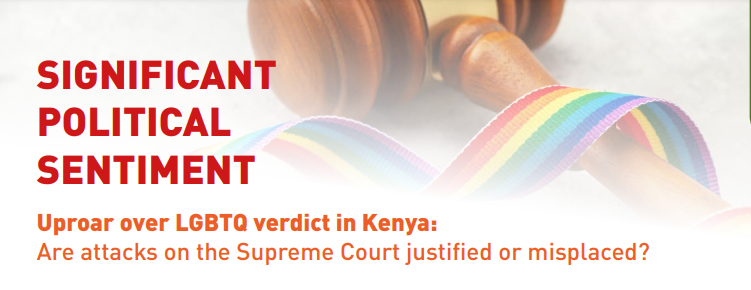Uproar over LGBTQ verdict in Kenya: Are attacks on the Supreme Court justified or misplaced?

Homosexuality remains criminalised in Kenya. However, the ruling by the Supreme Court that the LGBTQ community cannot be denied the right of association was met with protests from top political and religious leaders.
Likewise, some foreign missions like the Russian Embassy even showed support for a push by local leaders to condemn what they alleged is a promotion of LGBTQ culture in Kenya, by stating that top government officials have a responsibility of protecting the country’s traditional values or risk losing humanity.
President William Ruto swore that he would never allow gay marriages in Kenya. He argued that whereas he respects the courts, he disagrees with the ruling adding that religions of the land forbid same sex marriages.
“I am a God fearing man. Even though we respect the court, our religion, traditions, laws and customs do not allow for women to marry fellow women, nor for men to marry fellow men. I want to tell them that we have traditions, laws and customs, we respect our constitution and all our religions. We shall not allow women to marry women, or men to marry men. That is not possible in our country,” said President Ruto.
Deputy President Rigathi Gachagua said registering a group which fights for the rights of gay people to get married was an attempt to legitimise LGBTQ actions in Kenya, which was against the country’s way of life.
Azimio leader Raila Odinga claimed that the Judiciary overstepped its mandate in allowing registration of homosexual groups. “Article 45(2) of our constitution states that every adult has a right to marry a person of the opposite sex based on the free consent of the parties and that’s the law.” He added, “It is not the role of the Judiciary to make laws. If there is a lacuna, you go to Parliament for laws to be amended. Parliament has not amended any laws regarding homosexuality and if they have to, they must do it in line with Article 45(2),” said Mr. Odinga.
And on the day of the ruling, Homa Bay MP Peter Kaluma, who is sponsoring an anti-LGBTQ bill in Parliament, filed an official notice seeking to amend the law to give life imprisonment to people convicted of homosexuality or the promotion of it.
First Lady Rachel Ruto declared national prayers against homosexuality in the country, stating that the family unit was under attack. “We should not even try to talk about LGBTQ. This is a conversation we should not even have in our country because accepting it is like throwing our morals into the dustbin,” said Ms. Ruto.
Anglican Church of Kenya (ACK) Archbishop Jackson ole Sapit said the association will now want the court to legalize the act of the same sex as they will argue in the line of discrimination. “The next one will be we don’t want to be discriminated against because they have been recognized as an association,” the archbishop said. He added that: “Biologically, we have been created to procreate between a male and a female, this is attacking our norms and humanity.”
Archbishop of the Catholic Archdiocese of Nyeri Anthony Muheria, described homosexual acts as evil and warned against LGBTQ associations being used to recruit members.
“The Supreme Court ruling that those persons with these inclinations may associate, basically it means that perhaps it will be a way for them and us to address them, to work with them as human persons, but the acts of homosexuality can never be acceptable, they are evil,” said Archbishop Muheria.
Members of the Kenya Christian Professionals Forum (KCPF) said while Kenya’s Supreme Court has not overturned laws criminalizing homosexuality acts between consenting adults, “It has signaled that gays and lesbians can now engage untrammeled by legal restrictions to unravel our various guardrails against the promotion of homosexuality.”
These were some of the high-profile attacks on the ruling, which wrongly suggested that the verdict gives the LGBTQ community freedom to get married in Kenya.
However, the Atheists in Kenya Society has written to Mr. Kaluma condemning him and saying that as a lawyer and a legislator, he should be at the forefront of promoting human rights.
“What you are doing is fueling the repression of a marginalized community in Kenya. We expect you to be a promoter of gender diversity with respect to sexual orientation,” the society said. They said they will oppose the bill in Parliament and in the courts.
What does the law say?
Kenya’s Penal Code, which dates back to the British colonial period, criminalizes same-sex activity, will remain intact. The Penal Code describes the same-sex activity as “gross indecency” and “canal knowledge against the order of nature”, and further stipulates a 14-year jail term for anyone found guilty of engaging in homosexuality.
The Kenyan Constitution, adopted in 2010, following a referendum, has been widely recognized for being progressive. For instance, it has a robust Bill of Rights that guarantees human rights and fundamental freedoms of all Kenyans.
However, sections of Kenyan society were uncomfortable with some of the clauses. During the referendum on the Constitution, for instance, some members of the clergy as well as some politicians – including President Ruto, called on citizens to vote against it. One of the arguments was that the Constitution would lead to the legalization of homosexuality. The fact that 67 percent of Kenyans came out in support of the new constitution suggested that they had different concerns.
On February 24, Supreme Court of Kenya judges, Justice Mohammed Ibrahim and Justice William Ouko, put in writing dissenting opinions against the majority decision delivered by Justice Philomena Mwilu, Justice Smokin Wanjala, and Justice Njoki Ndung’u, that LGBTQ entities can operate at will after they are registered in Kenya.

